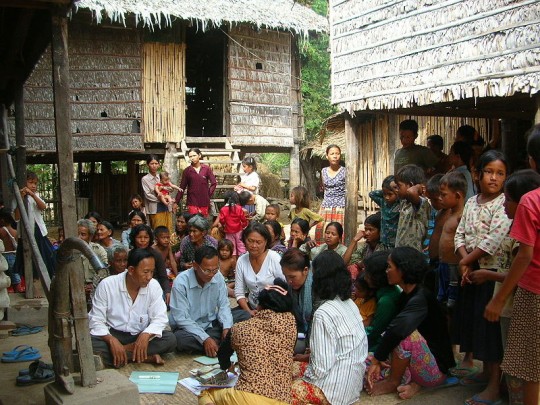Millions of rural poor to receive banking services under UN-backed initiative
Millions of rural poor to receive banking services under UN-backed initiative
 A village bank in Takeo province, Cambodia. Photo: Brett Matthews
A village bank in Takeo province, Cambodia. Photo: Brett Matthews
Two companies from India and South Africa announced today their commitment to provide banking services to 30 million low-income people living in rural areas by 2015, as part of their support for a United Nations-backed initiative to fight poverty.
The India-based company Vortex Engineering and South Africa’s Wizzit Bank will join the Business Call to Action (BCta) global initiative, which encourages private sector efforts to develop inclusive business models that can have both commercial success and a positive impact in development.
One of the main objectives of the initiative, which is supported by the UN Development Programme (UNDP), is to accelerate the Millennium Development Goals (MDGs), which include eradicating extreme poverty and hunger, the achievement of universal primary education, promoting gender equality, combating HIV/AIDS, tuberculosis and malaria and improving women and children’s health, all by 2015.
Lack of access to banking and credit impedes the economic empowerment of low-income individuals and hinders growth in the developing world.
Vortex Engineering will contribute by disseminating solar-powered cash machines tailored to rural communities’ needs, while Wizzit Bank will expand its access to credit for poor rural communities, the UNDP said in a news release.
“Lack of access to banking and credit impedes the economic empowerment of low-income individuals and hinders growth in the developing world,” said BCtA’s Programme Manager, Susan Chaffin. “We welcome Vortex and Wizzit as they seek to scale up activities that not only represent a business opportunity but also have tremendous potential to positively impact low-income communities in India and South Africa.”
According to the World Bank (WB), more than half of the adult population in South Africa and India lack access to formal banking, in contrast to the Netherlands, for example, where the entire adult population has access to banking services.
Vortex will address this gap by providing 10,000 solar-powered ATMs designed to withstand difficult weather conditions, erratic power supply, and lower literacy levels among cash dispenser users. The machines are expected to provide access to formal banking for 30 million people mostly in rural and semi-urban areas – many earning as little as $1 a day – over the next four years.
In South Africa, Wizzit Bank has committed to provide personal loans to 10,000 people. Since 2004, Wizzit’s customers have been using mobile phones for making and receiving payments, along with a debit card which can also be used at ATMs and stores. The company is now expanding its range of services to allow users, who usually live far from bank branches, to access microloans and credit through their phones.
###
About United Nations Development Programme (UNDP)

Since 1966, the United Nations Development Programme (UNDP) has been partnering with people at all levels of society to help build nations that can withstand crisis and drive and sustain the kind of growth that improves the quality of live for everyone. UNDP works in four main areas: poverty reduction and achieving the Millennium Development Goals (MDGs); democratic governance; crisis prevention and recovery; environment and sustainable development.
UNDP is the United Nations’ global development network, an organization advocating for change and connecting countries to knowledge, experience and resources to help people build a better life. We are on the ground in 177 countries, working with them on their own solutions to global and national development challenges. As they develop local capacity, they draw on the people of UNDP and our wide range of partners.
World leaders have pledged to achieve the Millennium Development Goals, including the overarching goal of cutting poverty in half by 2015. UNDP’s network links and coordinates global and national efforts to reach these Goals.
Our focus is helping countries build and share solutions to the challenges of:
- Fighting poverty
- Building democratic societies
- Preventing crisis, enabling recovery
- Protecting the environment
- Halting & reversing HIV/AIDS
- Empowering women
- Growing national capacity
UNDP helps developing countries attract and use aid effectively. In all our activities, we encourage the protection of human rights, capacity development and the empowerment of women.
More at: www.undp.org
###
> United Nations (UN).
 The United Nations was established on 24 October 1945 by 51 countries committed to preserving peace through international cooperation and collective security. Today, nearly every nation in the world belongs to the UN: membership totals 192 countries.
The United Nations was established on 24 October 1945 by 51 countries committed to preserving peace through international cooperation and collective security. Today, nearly every nation in the world belongs to the UN: membership totals 192 countries.
When States become Members of the United Nations, they agree to accept the obligations of the UN Charter, an international treaty that sets out basic principles of international relations. According to the Charter, the UN has four purposes:
- to maintain international peace and security;
- to develop friendly relations among nations;
- to cooperate in solving international problems and in promoting respect for human rights;
- and to be a centre for harmonizing the actions of nations.
###
* The above story is adapted from materials provided by United Nations (UN)
** More information at United Nations (UN)



















